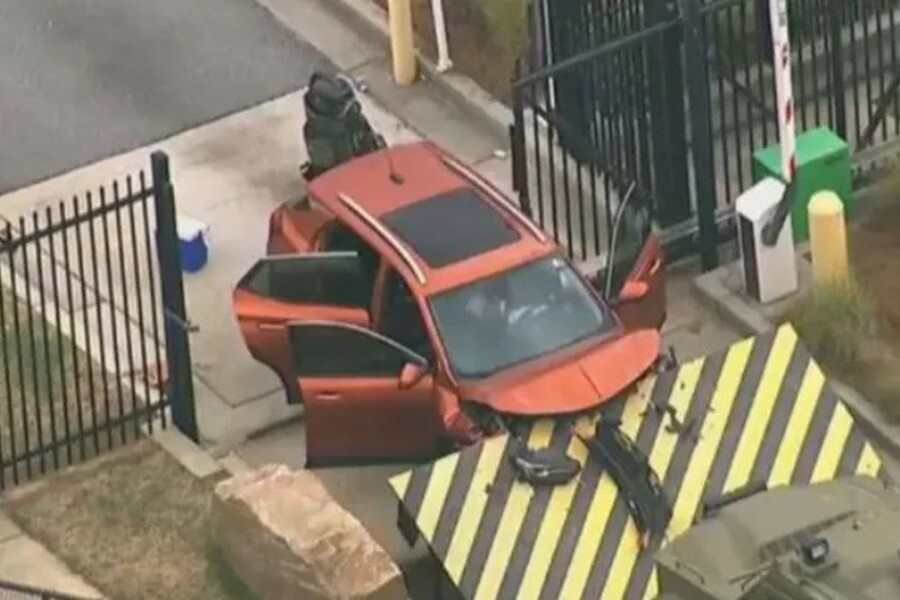
On a seemingly ordinary Monday, the tranquility of the Federal Bureau of Investigation’s Atlanta field office was shattered when an individual in a red SUV launched a daring attempt to breach the office’s fortified entrance. This incident, occurring just after the clock struck noon on April 1, 2024, has reignited discussions on the security of federal installations and the challenges law enforcement faces in a climate of heightened threats.
According to officials, the suspect, whose motives and identity remain under close investigation, executed a high-speed approach, aiming to penetrate the premises by closely following an authorized vehicle through the employee entrance.
This audacious attempt was promptly thwarted by the facility’s security measures, specifically, a pop-up barrier designed to neutralize such threats. Despite the failure to breach the perimeter, the suspect disembarked from the damaged vehicle, attempting to physically enter the building before being apprehended by FBI personnel and local law enforcement officers.
The quick containment of the situation was largely attributed to the preparedness of the FBI’s Atlanta staff and the immediate response by DeKalb County Police. The suspect was detained and later transported to Grady Memorial Hospital for a mental evaluation and treatment for minor injuries incurred during the incident.
Assistant Special Agent in Charge Peter Ellis provided a succinct overview of the event, praising the effectiveness of the bureau’s security protocols. He revealed that the incident occurred in the wake of a recent security drill aimed at bolstering the office’s defenses against unauthorized entries. This preparedness was instrumental in the flawless execution of security measures that ensured the safety of FBI personnel and the public.
Ellis, while refraining from speculative comments on the suspect’s motivations, emphasized the ongoing investigation to ascertain whether this was an isolated incident or indicative of a broader security threat. The event has drawn attention to the increasing concerns over the security of federal facilities against a backdrop of rising threats and attempts to compromise the integrity of law enforcement institutions.
In the hours following the incident, bomb technicians were dispatched to inspect the suspect’s vehicle as a precautionary measure. This standard protocol reflects the meticulous approach law enforcement takes in securing crime scenes and eliminating potential threats to public safety.
The FBI has announced the initiation of a comprehensive case into the attempted breach, considering both state and federal charges against the suspect. This incident underscores the relentless challenges faced by federal institutions in maintaining security amidst evolving threats. The bureau’s Atlanta office, through a combination of robust security infrastructure and vigilant personnel, managed to avert what could have escalated into a more severe security breach.
This event raises critical questions about the security measures in place at federal facilities and the necessity for continuous evaluation and enhancement of these protocols. The FBI’s ability to preemptively counter the attempted intrusion serves as a testament to the effectiveness of current security arrangements. However, it also highlights the imperative for ongoing vigilance and readiness to adapt to the sophisticated tactics employed by individuals intent on breaching these bastions of law and order.
Security experts point to the incident as a case study of the balance between accessibility and fortress-like security at public institutions. The evolving nature of threats, ranging from lone wolf actors to organized terror plots, necessitates a dynamic approach to security planning and execution. The FBI’s integration of physical barriers, surveillance technology, and rapid response protocols exemplifies the multi-layered defense strategy essential in today’s security landscape.
Moreover, the incident serves as a reminder of the unpredictable nature of threats against law enforcement and federal agencies. In recent years, the FBI and similar institutions have faced a myriad of challenges, from cyber-attacks to physical breaches, each presenting unique obstacles to the safety of personnel and the public. The rigorous training and preparedness exercises, such as the tabletop drill conducted by the Atlanta field office, are crucial in ensuring that staff are equipped to respond effectively to any scenario.
As the investigation unfolds, the law enforcement community and the public alike await answers that could shed light on the suspect’s motivations and potentially unveil any larger threats. The incident at the FBI’s Atlanta headquarters is a stark reminder of the ever-present need for vigilance in safeguarding our nation’s critical institutions against those who seek to undermine them.
The broader implications of this event extend beyond the immediate security considerations, touching upon issues of mental health, the accessibility of federal buildings, and the societal factors that drive individuals to undertake such drastic actions. It invites a nuanced discussion on the balance between open, democratic institutions and the need for stringent security measures to protect them.
The attempted breach at the FBI’s Atlanta field office stands as a pivotal moment for federal security operations, highlighting both the strengths and potential vulnerabilities in the current approach to protecting critical infrastructure. As the bureau and its partners in law enforcement proceed with their investigation, the incident catalyzes a broader examination of how best to navigate the complex landscape of national security in an era of unprecedented challenges.





